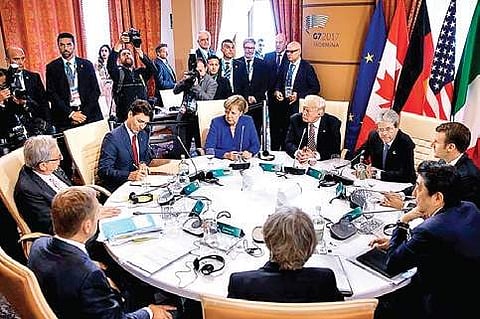

India has invited US President Donald Trump to be its Chief Guest for the 2019 Republic Day Parade. One needs to be prepared for all sorts of contingencies in hosting Trump. He has little time or respect for diplomatic niceties and has not hesitated to embarrass and even humiliate hosts. During his recent visit to the UK, Trump was critical of British Prime Minister Theresa May, when she was facing mounting pressures, criticism and even revolt in her party.
Just a few days earlier, at a Summit meet of NATO allies, Trump rained criticism on European leaders, for not spending enough on defence. He lashed out at German Chancellor Angela Merkel. He noted the inconsistencies in her calls for greater pressures on Russia, just when Germany itself was set to import large quantities of Russian natural gas, through an undersea pipeline. Merkel hit back, reminding Trump that NATO members had contributed troops in Afghanistan, to join American forces there, after the 9/11 terrorist attacks.
Trump’s behaviour in Vancouver at a G7 Summit meeting was no different. He was critical of his host, Canadian Prime Minister Justin Trudeau. Just before the meeting, he placed additional duties on US imports of aluminium and steel, enraging European leaders, who threatened retaliation.India, which exports both aluminium and steel, to the US, hit back by taking up its complaints on US trade restrictions, with the WTO and levying additional duties, primarily on US exports to India. Trump complained of high duties placed by India on the Harley Davidson motorcycles.
Trump appears to be fond of authoritarian rulers like President Rodrigo Duterte of the Philippines, Xi Jinping of China and above all Russia’s Vladimir Putin, who is disliked by virtually the entire American foreign and security policy establishment, apart from politicians on both sides of the American political divide. They have been bent on eroding Russia’s influence in the world, even as they sought to undermine its traditional influence across its borders, with neighbours like Ukraine and Georgia.
They also refused to accept that there was a historical rationale in Russia’s takeover of Crimea, whose majority population is Russian. These propensities and prejudices in the American diplomatic and intelligence establishments have led to American efforts to undermine Russian security and economic interests.
The wide-ranging Trump-Putin joint press conference in Helsinki, where Trump averred that he was determined to build bridges in areas ranging from nuclear arms control to developments in Syria, was really sensational. Putin, in turn, ridiculed American allegations of Russian interference in US Presidential elections and hinted at American interference in Russia’s internal affairs.
Trump has no animosity towards India and appears to regard India as a growing market for American goods and services. He understands that India plays a useful role in complementing American policies in Afghanistan, though his administration is evidently seeking to persuade Pakistan to end its assistance for Taliban and facilitate an intra-Afghan dialogue. It remains to be seen if he will take advantage of Pakistan’s growing need for western financing to bail it out from its looming foreign exchange crisis, by turning the screws on Pakistan, through institutions like the IMF.
Trump listens to his professional aides on a promoting cooperation with India, to balance growing Chinese power and influence across the Indian Ocean. But, at the same time he would not be averse to conceding strategic space to Russia and China, if he gets business ‘deals’ and some meaningful moves on North Korea, which he can furnish to fellow Americans as a major ‘achievement’.
G Parthasarathy, former diplomat
dadpartha@gmail.com